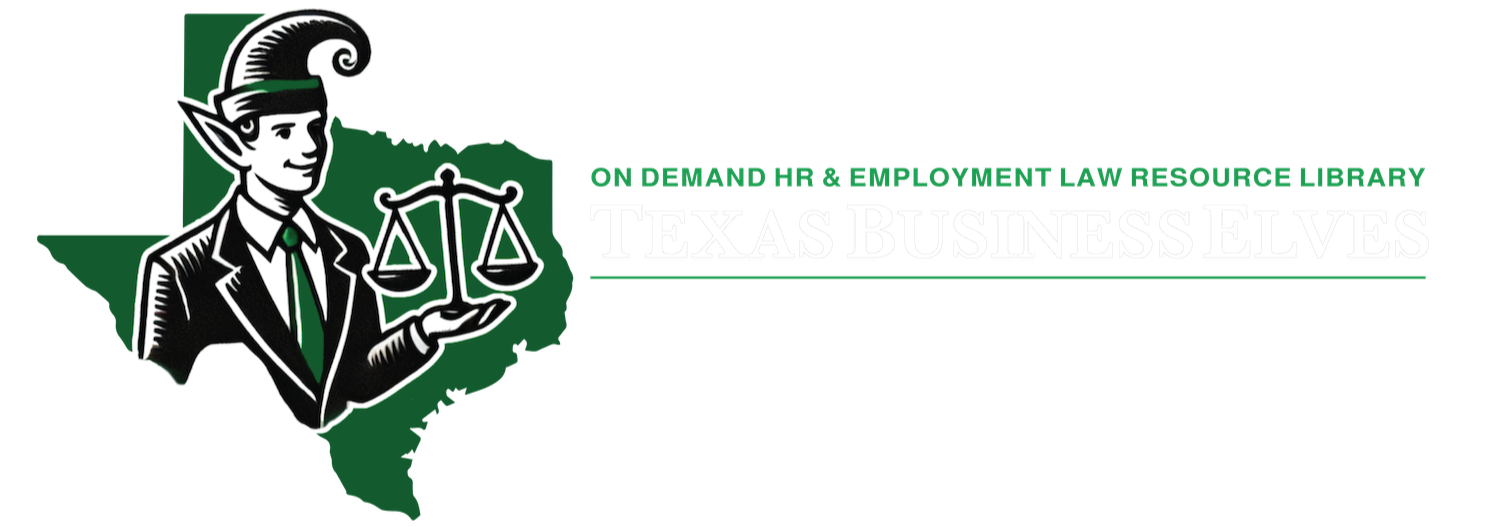
Texas Business ELVES Employment Law Dictionary
A Free Legal Dictionary for Employers, HR Professionals, & Workers
Essential Job Functions
Fundamental duties of a particular position. Put another way, those tasks and functions that an individual in the role absolutely must be able to perform because those functions are basically the reason the job exists in the first place…
Escalator Position
Position an employee would have attained had they not taken time off to serve in the military. The Uniformed Services Employment and Re-employment Rights Act (USERRA) guarantees certain employment rights to employees who serve in the uniformed services…
Equal Pay Act (EPA)
Federal law requiring employers to provide male and female employees equal pay for equal work. Put another way, the EPA prohibits gender-based pay discrimination between male and female employees in the same workplace who are performing similar work under similar working conditions…
Equal Employment Opportunity Commission (EEOC)
Federal government agency tasked with administering, interpreting, and enforcing federal laws that prohibit employment discrimination and harassment and, in many instances, retaliation. Federal statutes enforced by the EEOC include the Americans with Disabilities Act (ADA), the Age Discrimination in Employment Act (ADEA), and Title VII of the Civil Rights Act of 1964 (Title VII), which is the law that created the EEOC…
Employment Eligibility Verification Form (I-9)
Officially USCIS Form I-9 (Employment Eligibility Information Form), this document must be completed by both the employee and the employer when a new employee begins work to prove that the employee is legally authorized to work in the United States…
Employment Contract
Also sometimes referred to as an employment agreement, it is an agreement between an employer and an employee regarding the terms of the employment relationship…
Employer
Essentially, a person or entity that hires an individual (i.e., “employee”) to perform work in exchange for compensation and that retains the right to direct and control how the employee performs the work. That being said, different employment laws contain their own specific definitions of “employer” that can lead to an individual or entity being considered an employer under one law but not another…
Employee Retirement Income Security Act (ERISA)
Federal law that sets minimum standards for regulating pension plans and health benefits plans offered by private employers to ensure certain protections are provided to employees…
Employee Polygraph Protection Act (EPPA)
Federal law that strictly limits the circumstances in which an employer can require job applicants or employees to take a polygraph test…
Employee Assistance Program (EAP)
Employee benefit that provides assistance to employees for dealing with personal or family issues, such as financial problems, divorce, estate planning, elder care, or substance abuse…
Duty of Loyalty
Obligation of an employee to avoid acting in ways that conflict with or compete with the employer’s interests while employed. This obligation may be legally enforceable under one or more legal theories and claims depending on the circumstances…
Drug Testing
Screening of the hair, urine, saliva, breath or blood of an individual to determine whether they use certain specified drugs…
Dress Code
Employer policy or requirements that regulate employee appearance. Dress codes can range from merely requiring employees to maintain a neat and clean appearance at all times at work to very specific and unique requirements, often based on safety or company branding and public relations concerns…
Domestic Violence Leave
Legally required time off from work under either federal or state law for victims of domestic violence. Depending on the applicable law, this leave may be paid or unpaid…
Disparate Treatment
Legal theory permitting an individual to prove employment discrimination by showing that he or she was treated less favorably than other similarly situated individuals with respect to employment decisions or terms and conditions of employment, and that this disparate treatment was based on one or more protected characteristics (i.e., race, gender, religion)…
Disparate Impact
Legal theory permitting an individual to prove employment discrimination based on the statistical effects of a seemingly unbiased employer policy or practice rather than based on intent…
Discrimination
In employment law, the making of employment decisions based on an individual’s protected characteristic (such as race, gender, religion, etc.) or on a factor that is not job-related but has a disparate impact on members of a protected class…
Disability
The definition of “disability” can vary depending on the specific aspect of employment law involved. The most common employment law scenarios involving disability are those alleging disability discrimination or harassment under the federal Americans with Disabilities Act (ADA) or a similar state-level disability discrimination law (in Texas, Chapter 21 of the Texas Labor Code)…





















